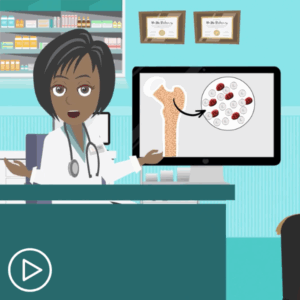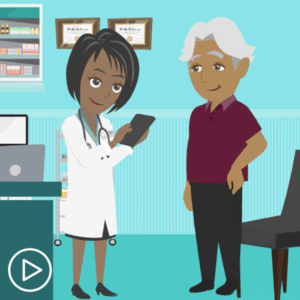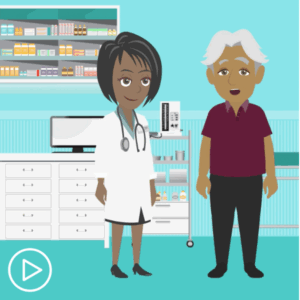What challenges can affect your ability to access quality chronic lymphocytic leukemia (CLL) care? This animated video offers practical tips and resources to help you tackle common barriers.
Related Resources
Transcript
Joseph:
Hi! Welcome back to the CLL Collaborate video series. I’m Joseph, and this is my doctor, Dr. Johnson. As we’ve said in previous videos, the goal of this series is to help you understand and get the best care for YOU.
Sadly, not all patients receive the same quality of healthcare due to factors beyond their control. These are called health disparities. Health disparities happen when things like access to medical professionals, costs—or other circumstances—make it harder for some people to receive care they deserve.
Dr. Johnson, can you share more about this?
Dr. Johnson:
Sure. These are complex issues, but they include things like:
- Whether a person has access to health insurance.
- Communication problems related to language or culture.
- Disabilities and mental health issues.
- Cost and affordability of care.
- Race, gender identity, sexual orientation or religion.
- And geographic location—like living in a rural area that has limited access to medical centers.
I should also mention that a person’s ability to find, understand, and use health information and services can impact how they make care choices for themselves and others. This is called health literacy—you’re boosting your health literacy by watching this video!
Joseph:
Right, Dr. Johnson! The goal of ensuring everyone receives the same level of care, no matter their situation is called health equity. And while there are no easy fixes, there are resources available to patients and their loved ones.
Dr. Johnson:
Exactly. And as we’ve said throughout these videos, it is important that you speak up and share your opinions and wishes with your healthcare team. You should be at the very center of your decisions.
Joseph:
Right! And if you feel like no one is listening to you or you are being brushed aside, remember that you can always get a second opinion or find a new doctor. Of course, that’s easier said than done.
Dr. Johnson:
I hear you, Joseph. Patients may be concerned about offending their doctor if they switch, but this shouldn’t be the case. It’s YOUR care—put yourself first.
Joseph:
Great advice!
Dr. Johnson, can you please walk through resources that patients can turn to for help?
Dr. Johnson:
I’d be happy to.
As I mentioned, lack of insurance and the high cost of care may negatively affect a patient’s health. The Patient Empowerment Network has created a Financial Resource Guide that can connect you with support. Use this QR code to access it.
And if you are having trouble paying for medical care, government services and advocacy groups like the American Cancer Society, Cancer Care and The Leukemia & Lymphoma Society may offer support.
Since cancer treatment can be expensive, many drug companies also have patient assistance programs for those who qualify.
Additionally, many medical centers have programs that may reduce or forgive bills for patients who can’t afford them.
We also discussed how language can be a barrier for patients. If English is not your preferred language, medical centers often have trained interpreters who can join appointments to assist with communication.
Location is another issue—so if where a patient lives is affecting their access to care, there are transportation and lodging programs through organizations like the American Cancer Society and Joe’s House.
You should also know that the team at your medical center will have options specific to your situation.
Joseph:
Thank you, Dr. Johnson! I would also add that it’s important to know your rights.
Triage Cancer and the Patient Advocacy Foundation offer legal resources to help patients understand and assert their workplace rights.
And if someone feels they are experiencing discrimination when seeking care, they can reach out to the American Civil Liberties Union—also known as the ACLU—for help.
Dr. Johnson:
Thanks for mentioning those, Joseph. I want to remind viewers that it’s YOUR care. Don’t hesitate to speak up, ask for help, and get your questions answered.
And you can find a full list of resources on PEN’s website. Download the guide that accompanies this video to access that information, along with all of the recommended organizations we discussed.
Thanks for joining us! Visit powerfulpatients.org/cll to watch more videos with Joseph and me.



